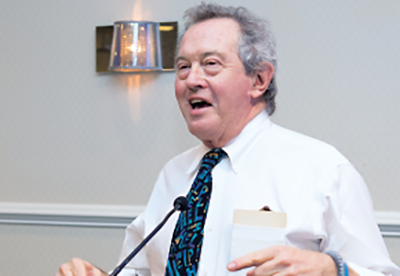When Should Psychiatrists Disclose Mental Health Problems?

Among all the medical disciplines, psychiatrists have been at the forefront of encouraging patients to adopt ideas like recovery, resilience, engagement, and most importantly the attenuation of stigma in one’s disorder.
Yet when confronting their own mental health issues, psychiatrists lean toward privacy, noted Robert Marin, M.D., an associate professor of psychiatry at the University of Pittsburgh Medical Center. This bit of irony was the focus of a special workshop chaired by Marin today at APA’s Annual Meeting titled “Talking about Our Own Mental Health and Mental Illness: Pros and Cons of Self-Disclosure.”
To provide some examples of how self-disclosure can be beneficial as well as illustrate the rationale psychiatrists use when concealing problems, Marin and co-presenter Steven Moffic, M.D. (pictured above), discussed their experiences of mental illness and wellness.
Moffic, a retired psychiatrist formerly of the Medical College of Wisconsin, mentioned an incident during his residency when he tried hashish and ended up with a severe dissociative episode that lasted for over a week. He was completely unable to focus at work, yet he told no one for fear of possible punishment and personal shame. Eventually he confided in his residency director and received not chastisement, but a recommendation for a good therapist who helped resolve his problem.
Decades later, Moffic found himself so irritated with the bureaucracy at Wisconsin, such as rules that limited patient interaction to 10 minutes (and that his trip to the APA Annual Meeting would not be reimbursed) that he decided to retire. He was already 65, so he believed that it was a normal course of events, but during a conversation, a colleague indicated that he had experienced burnout.
“I asked him, ‘How can you be sure?’” Moffic relayed to the audience. “He said, ‘Because it happened to me.’ ”
Moffic added that studies have suggested that psychiatrists are on the low end when it comes to physician burnout, at around 42 percent. “We as a field are proud of that statistic, yet think about it. We are proud that almost half of our colleagues go through years of stress and strain during which time they suffer, their families suffer, and their patients suffer.”
Marin, who discussed his own struggles with depression and attention-deficit/hyperactivity disorder, noted how personal and interpersonal reasons like fear, isolation, distrust, or lack of awareness lead psychiatrists to keep themselves bottled up. But as a “card-carrying community psychiatrist,” he also realized that disclosing struggles to his patients was both personally liberating, but also therapeutic as it can engender trust between patient and provider.
The issue of when to disclose to patients was a popular question among the audience. Marin recommended that a doctor should ask “Why here and why now?” when considering disclosing. “If it’s more about you and narcissism, then don’t do it,” he said. “Also, think about how well you know the patient. I would not make any disclosures at the first session, for example.”
Michael Myers, M.D., a professor of clinical psychiatry at SUNY-Downstate Medical Center in Brooklyn and a leading “psychiatrist’s psychiatrist,” elaborated on the dynamics of self-disclosure, reiterating the many individual and collective benefits of doing so.
He cautioned that there can be drawbacks. He quoted psychologist and author Kay Redfield Jamison, Ph.D., who went public with her bipolar disorder, about receiving some “wicked comments.”
That information was not meant to dissuade people from disclosing information about their mental health, but he did want to share that there can be negative consequences. Nonetheless, he believes that if disclosure is made for the right reasons, the good should outweigh the bad.
“If you do happen to hear someone else tell a personal health story, let the person know such sharing is a real gift, because I do believe it saves lives,” Myers concluded.
|
|
|
|
|


